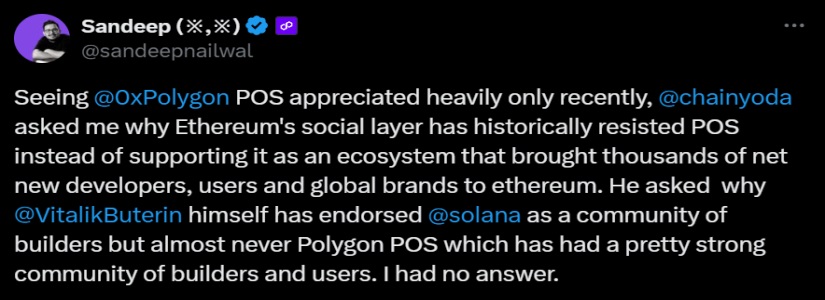TL;DR
- Sandeep Nailwal questions the lack of support from Vitalik Buterin for Polygon PoS, despite its contribution to Ethereum’s growth.
- Polygon PoS has managed to reduce transaction fees to $0.015 and facilitated the migration of dApps, but it has not received the expected recognition.
- Nailwal criticizes Ethereum’s bias towards abstract definitions like decentralization, suggesting that this has overshadowed other practical solutions.
Sandeep Nailwal, co-founder of Polygon, has expressed his confusion about the lack of support from Vitalik Buterin, co-founder of Ethereum, for Polygon PoS, a network that has played a crucial role in the adoption and growth of ETH.
In a message shared on X (formerly Twitter), Nailwal questioned why Ethereum, despite Polygon’s achievements, has shown resistance to the solution, while Buterin has openly praised Solana, a competing blockchain.
Polygon’s Contributions to the Ethereum Network
Polygon PoS has managed to reduce transaction fees to an average of $0.015, making it considerably cheaper than Ethereum’s mainnet fees. Additionally, its sidechain model processes transactions efficiently, alleviating congestion and reducing gas costs on the Ethereum network. This solution has been crucial in attracting thousands of developers and projects to the ETH ecosystem, as it allows for dApp migration without needing to rewrite code, thanks to compatibility with the Ethereum Virtual Machine (EVM).
Despite these achievements, Nailwal feels that the Ethereum community has not adequately recognized the value Polygon has brought to the ecosystem. The feeling of a lack of support is even more evident when compared to Buterin’s backing of Solana, a blockchain known for its focus on decentralization and speed, but also criticized for its complexity.

A Lack of Appreciation for Results
Buterin has “praised” the Solana network for its ability to decentralize and its high Nakamoto coefficient, which measures the distribution of validators in the network. However, he has also pointed out that its focus on efficiency could sacrifice decentralization principles.
Sandeep Nailwal reflected on the situation and suggested that Ethereum’s community bias toward abstract definitions, such as decentralization, has led to a lack of recognition for solutions that truly benefit users. Despite the resistance to Polygon PoS, Nailwal remains convinced that this model has made a significant contribution to Ethereum’s blockchain and hopes the community will begin to value tangible results over abstract theories
